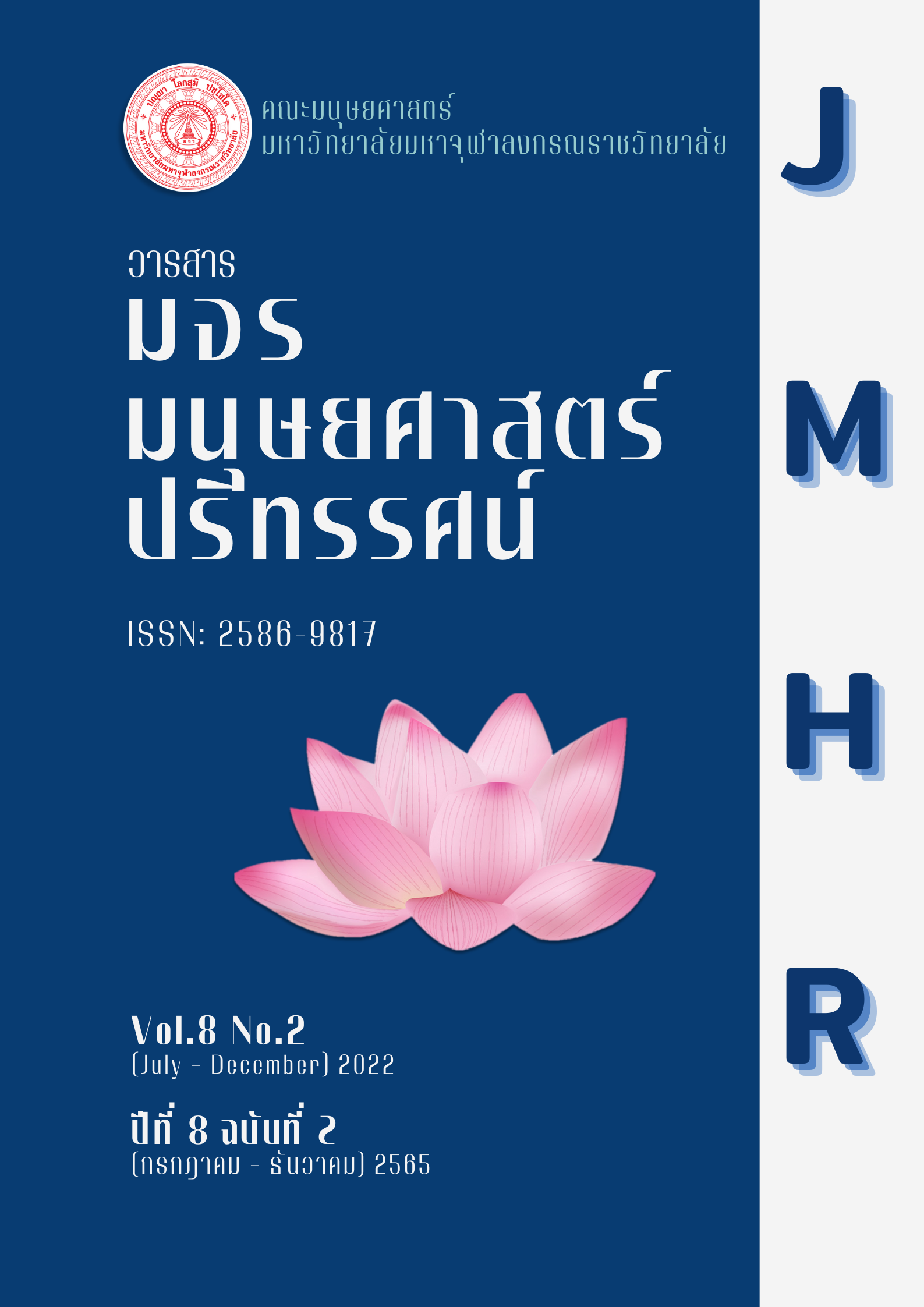แนวทางการสร้างโอกาสการเรียนรู้สำหรับเด็กด้อยโอกาสตามแนววิถีพุทธ
คำสำคัญ:
การสร้างโอกาส, การเรียนรู้, การสร้างโอกาส, การเรียนรู้, เด็กด้อยโอกาสบทคัดย่อ
บทความนี้ เป็นส่วนหนึ่งของดุษฎีนิพนธ์เรื่อง “แนวทางการสร้างโอกาสการเรียนรู้สำหรับเด็กด้อยโอกาสตามแนววิถีพุทธ” มีวัตถุประสงค์ 1. เพื่อศึกษาแนวทางการสร้างโอกาสการเรียนรู้สำหรับเด็กด้อยโอกาสตามแนววิถีพุทธ 2. เพื่อศึกษากระบวนการสร้างโอกาสการเรียนรู้สำหรับเด็กด้อยโอกาสตามแนววิถีพุทธ และ 3. เพื่อวิเคราะห์รูปแบบกระบวนการสร้างโอกาสการเรียนรู้สำหรับเด็กด้อยโอกาสตามแนววิถีพุทธ การวิจัยนี้เป็นการวิจัยเชิงคุณภาพ จากการสัมภาษณ์ (Interview) และสนทนากลุ่ม (Focus Group) ผลการวิจัย พบว่า
- แนวทางการสร้างโอกาสการเรียนรู้สำหรับเด็กด้อยโอกาส พบว่า จากสภาพปัญหาของการศึกษาของเด็กด้อยโอกาสในปัจจุบันที่กระทรวงศึกษาธิการพยายามจัดการศึกษาให้มีความเสมอภาคและทั่วถึง การจัดการศึกษาแบบบูรณาการทั้งด้านวิชาการ และทักษะในการดำรงชีวิต นอกจากนี้ยังมีการส่งเสริมด้านสิทธิต่าง ๆ
- กระบวนการสร้างโอกาสการเรียนรู้สำหรับเด็กด้อยโอกาสตามแนววิถีพุทธ พบว่า การจัดการศึกษาโดยการนำหลักธรรมทางพระพุทธศาสนามาบูรณาการการเรียนรู้ด้านวิชาการตามหลักภาวนา 4 กับเด็กด้อยโอกาส ดังนี้ 1. ด้านกาย (กายภาวนา) พบว่า มีการบูรณาการการเรียนรู้พัฒนากาย ศีล จิต ปัญญาไปพร้อมกันเพื่อให้มีกระบวนการเรียนรู้ที่มีคุณธรรมประจำใจ โดยมีการสวดมนต์นั่งสมาธิก่อนเรียน สวดมนต์ยาวทุกสัปดาห์ เข้าร่วมกิจกรรมกับทางวัดในวันสำคัญทางพระพุทธศาสนา 2. ด้านศีล (สีลภาวนา) พบว่า ครูที่ปรึกษาคอยอบรมสั่งสอนและการรักษาศีล 5 เป็นหลักในการอบรมเป็นแนวทาง โรงเรียนได้จัดรายวิชาเพิ่มเติมที่ส่งเสริมสนับสนุนให้ผู้เรียนมีพฤติกรรมเป็นผู้ที่คุณธรรมจริยธรรม 3. ด้านจิต (จิตภาวนา) พบว่า มีการจัดการเรียนการสอนที่มุ่งในการมีคุณธรรมจริยธรรมมีการสอดแทรกคุณธรรมจริยธรรมในชั่วโมงเรียนให้นักเรียนรู้จักจิตของตนเอง 4. ด้านปัญญา (ปัญญาภาวนา) พบว่า สังคมโลกยุคศตวรรษที่ 21 ถือเป็นสังคมแห่งข้อมูลข่าวสารที่มาพร้อมกับความก้าวหน้าทางเทคโนโลยี และการสื่อสาร โดยต้องเน้นการพัฒนาผู้เรียนที่มีทักษะการคิดมากขึ้น การคิดวิเคราะห์ และการคิดอย่างมีวิจารณญาณ
- รูปแบบกระบวนการสร้างโอกาสการเรียนรู้สำหรับเด็กด้อยโอกาสตามแนววิถีพุทธ พบว่า การจัดการศึกษาแบบบูรณาการทั้งด้านวิชาการ ศีลธรรม จริยธรรม และทักษะในการดำรงชีวิต ใช้หลักธรรมทางพระพุทธศาสนามาเป็นแนวทางในการสร้างโอกาสในเรียนรู้หลักการดำเนินชีวิต ทำให้เกิดการบูรณาการการเรียนรู้ตามหลักภาวนา 4 ครอบคลุมการพัฒนาครบ 4 มิติทั้งด้านกายภาพ สังคม จิตหรืออารมณ์ และปัญญา
เอกสารอ้างอิง
จรรยา ดวงแก้ว และคณะ. (2551). การศึกษาและพัฒนากระบวนการเรียนรู้ตามแนวทางสติปัฏฐานสี่สู่การปรับเปลี่ยนคุณค่าภายในตัวเองของเยาวชนโรงเรียนยโสธรพิทยาคม (รายงานการวิจัย). ยโสธร : สำนักงานกองทุนสนับสนุนการวิจัย.
พระพรหมคุณาภรณ์ (ป.อ. ปยุตฺโต). (2546). พุทธธรรม (ฉบับเดิม) (พิมพ์ครั้ง 10). กรุงเทพฯ: บริษัท เอส. อาร์ พริ้นเตอร์ แมส โปรดักส์ จํากัด.
ศิริศักดิ์ นันตี. (2557). การบูรณาการหลักการพระพุทธศาสนาในการพัฒนาทรัพยากรมนุษย์ (วิทยานิพนธ์พุทธศาสตรดุษฎีบัณฑิต). มหาวิทยาลัยมหาจุฬาลงกรณราชวิทยาลัย : พระนครศรีอยุธยา
สำนักบริหารยุทธศาสตร์และบูรณาการการศึกษาที่ 1, (2554). แผนปฏิบัติราชการการศึกษา ประจำปีงบประมาณ 2554 กลุ่มจังหวัดที่ 16 (ภาคเหนือตอนบน 2). เชียงใหม่: สำนักบริหาร ยุทธศาสตร์และบูรณาการ การศึกษาที่ 1.
สำนักงานศึกษาธิการจังหวัดน่าน. (2563). สืบค้น 17 มิถุนายน 2563, จาก http://peonan.go.th/news-detail_1719_29761
วชิราพร สุวรรณศรวล และคณะ. (2556). รูปแบบการจัดการศึกษาทางเลือกสำหรับเด็กด้อยโอกาสทางการศึกษา ในเขตพื้นที่สูงภาคเหนือตอนบนของประเทศไทย. วารสารศึกษาศาสตร์มหาวิทยาลัยนเรศวร, 15(2556), 186-187.
วัลยา มนัสเกษมสิริกุล. (2551). กระบวนการจัดการศึกษาสำหรับเด็กย้ายถิ่นข้ามชาติโดยองค์กรพัฒนาเอกชน : กรณีศึกษา อำเภอแม่สอด จังหวัดตาก (วิทยานิพนธ์ปริญญามหาบัณฑิต). จุฬาลงกรณมหาวิทยาลัย : กรุงเทพฯ.

ดาวน์โหลด
เผยแพร่แล้ว
รูปแบบการอ้างอิง
ฉบับ
ประเภทบทความ
หมวดหมู่
สัญญาอนุญาต
ลิขสิทธิ์ (c) 2022 วารสาร มจร มนุษยศาสตร์ปริทรรศน์

อนุญาตภายใต้เงื่อนไข Creative Commons Attribution-NonCommercial-NoDerivatives 4.0 International License.





